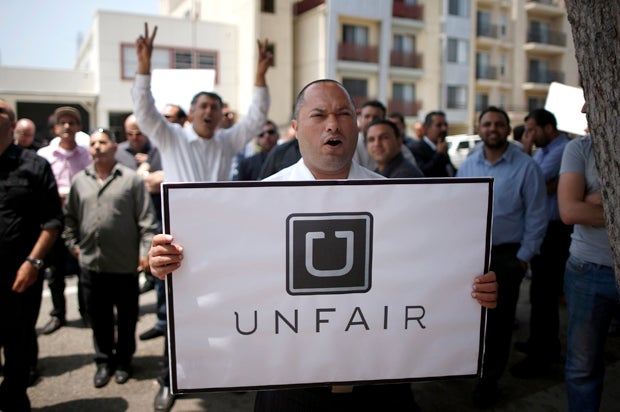WCP: The Work Lives of Uber Drivers Are Worse Than You Think
Posted in Visiting Scholars | Tagged Declan Cullen, Gig Economy, John Russo, Kafui Attoh, Katie Wells, Precarity, Sharing economy, Sherry Linkon, Technology, Uber, WCP, Working-Class Perspectives
Uber promises freedom and flexibility to drivers but instead delivers risk, exploitation, and low wages that compel drivers to work long and inconvenient hours. That is what Katie Wells, Kafui Attoh, and Declan Cullen discovered by conducting a groundbreaking series of interviews with 40 Uber drivers in the DC area, highlighted in this week’s Working-Class Perspective.
“Aman bought a Lincoln Town Car in 2012 after he been approved to drive for Uber Black, the brand-new private car service. As an Ethiopian immigrant in Washington, D.C., he had supported himself by driving a taxi so he already had the chauffeur license that was then required. In 5 or 6 hours of driving, he earned what would have taken him 8 hours in a taxi.
But, not long after he took on the $35,000 loan for the car, Uber changed a policy about how old cars could be, and the Lincoln Town Car no longer qualified. Aman could no longer drive for Uber Black, and he could no longer make his car payments.
Like Aman, many Uber drivers are on a debt-to-work pipeline, taking on a significant financial risk to get the chance to earn a wage. Drivers invest upfront nearly all of the costs of running a car service: the vehicle itself, maintenance, gas, insurance, and taxes. On top of that they incur tolls, parking tickets, “dead miles” (the distance driven while waiting for or driving to pickup a passenger), safety devices (dash cameras and mace), and rider extras (water and mints). And drivers have no guarantees about how much they will earn, when there will be surge pricing, or whether they will come down with an illness and be unable to work. One driver put it this way: “You’d be better off working at McDonald’s.”
The problem isn’t just uncertainty about what drivers can earn. Some also end out in deeper financial trouble by leasing cars from Uber’s Xchange program. One driver, Joan, got caught in this trap after she hit a pothole and damaged her car’s suspension system. She spent nearly all the money she had to get the car fixed. Then, when efforts to repair the vehicle failed, she spent more to lease a car from Uber. While Xchange offers lower credit barriers than traditional lenders, the payments which Uber automatically deducts from drivers’ paychecks, are high.
Joan pays $138, more than the national lease average of $100 per week. Another driver we interviewed pays $290 per week and, at the end of her 3-year lease, she will have paid two or three times her car’s value. Think company town, or as one of our other drivers said, “indentured servitude.” The costs of these subprime leases are exorbitant, but, according to the Federal Trade Commission, Uber has actively deceived drivers about those costs. A Massachusetts Attorney General also found that Uber’s former lender charged higher-than-allowed interest rates to drivers in low-income communities.
Along with significant financial risks, Uber drivers struggle to make sense of the company’s constantly changing rules and opaque management practices. In the four years it has been operating in Washington, D.C., Uber has reduced its base rate for drivers several times, added a rider safety fee (and then increased it, calling it a booking fee), and raised the commission it takes from new drivers. The rules and details of work for Uber change, sometimes hourly. A majority of the drivers we interviewed reported that their wages have dropped so much that they will only drive during hours when there is likely to be surge pricing or in areas where other incentives give them a better chance of earning decent wages. One driver commented that “They’re really playing games with [the rates], and…I don’t like that.” These games, which are built into the heart of the Uber platform, have a point: to keep Uber drivers on the road and in the dark.”
Read the entire post and check out other Working-Class Perspectives posts on our website.

